You may think you have to choose between pursuing a degree and gaining job experience. You may fear that investing in both of these time-consuming activities will lead to problems like stress and underachievement. Yet students regularly prove that this is far from the truth. When you have a clear goal in mind and learn how to manage your time, you won’t struggle to integrate both your work and your studies into your schedule.
You just need a goal and a plan.
This article will explain how you can gain relevant work experience before graduation and take advantage of different occupations. Our experts have gathered tips to help you find a job that won’t interfere with your studies.
📑 Why Should You Work While Studying?
Working as a student is advisable for numerous reasons, some of which are unique to each particular person. Here is a list of the most common ones:
1) Finding a job after college is easier with experience. Relevant job experience will help you immensely while looking for an occupation after graduation. Employers look for dedication, enthusiasm, and, yes, a record of your work experience in the field. The more pertinent achievements and experience you can add to your resume, the more attention you will get as a possible candidate for a position.
2) Practice makes perfect and adds to your academic knowledge. To excel in your profession, you have to be actively involved in it. Getting a job will help you apply what you’ve learned in class to situations you face on the job. Working in the field can expand your knowledge by bringing theory to life.
3) You can decide whether or not you enjoy working in that particular field. Taking a job helps you determine if the career path you have chosen meets your expectations and satisfies you. If you are disappointed, you can change your study plans or adjust new goals before it’s too late and you’re stuck in a tedious job you don’t like.
4) You can get paid for what you’re studying. Students who start working during their first years of college can usually provide for themselves by their final year. After graduation, they can also anticipate a raise in their salary. Besides, working during college helps to reduce college debt.
5) Your grades could improve when you start working. According to some students, working during college helps develop time-management skills that enable them to keep up with their studies, homework, and part-time jobs. There’s little time to procrastinate or party, which helps to focus on what’s vital—studying. However, this is the case only for those who work 20 hours per week or less. Students who work full-time tend to have much lower grades than their peers.
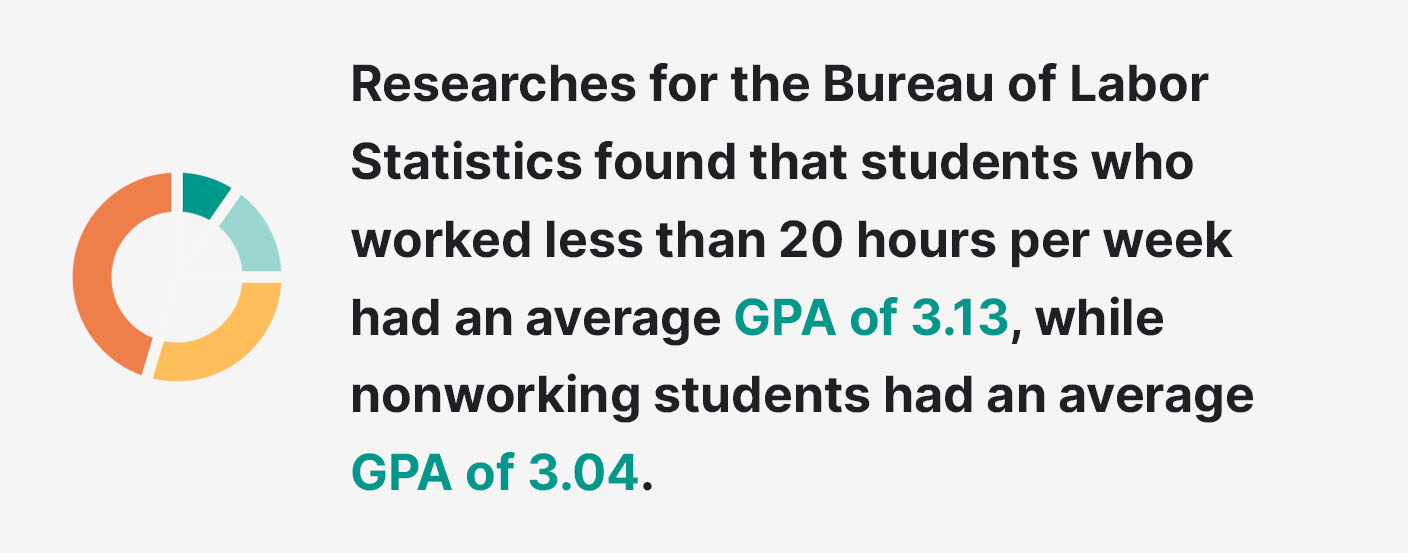
With these points in mind, consider how you can get a head start on your career path while in college. Apart from that, consider taking a look at our essay examples database. Among numerous papers on the widest variety of topics, there are ones containing valuable insights about gaining work experience.
💯 How Can You Acquire Experience as a Student?
This is one of those burning questions that plague students’ minds. Many assume that it’s impossible to find a job that won’t interfere with their studies. However, the following sections will convince you otherwise.
⭕ 1. Internship
An internship is a professional training opportunity that allows students and recent graduates to gain meaningful career-related experience. It offers you a chance to expand your knowledge and fortify much-needed hands-on skills.
Internships are usually well supervised and structured with a clear and defined goal. They can be full-time or part-time. Full-time internships typically take place during summer, and part-time can take place during the school year.
What are the main benefits of internships?
- Practical hands-on experience:
There is no better way to learn than to practice. When you start a professional internship, you find out what it takes to be successful in your career of choice. By the time most students decide to become interns, they have already acquired a lot of theoretical knowledge. Thus, going into the field and practicing what you’ve learned can help you perfect your understanding of your career.
- Networking in the company or field:
Another benefit of an internship is the opportunity to build professional relationships within the field. For the vast majority of students, networking within an internship helps them get a good start after graduation.
- Starting your career at the company:
If you do well in your training program, you might be offered a position at that firm after graduation. If you are inclined, you should express your interest in joining the team in the future.
- Getting exposure in the field:
One more benefit of an internship is that it gives you experience in the field and helps you write a CV. Most entry-level jobs require some professional experience—for a recent graduate, this can be a challenge.
- Long term success in the field:
Studies show that young professionals who have had a chance to intern before graduation are more likely to be successful in their careers. Not only will it help you find a job faster, but it will let you know whether or not you enjoy working in that field.
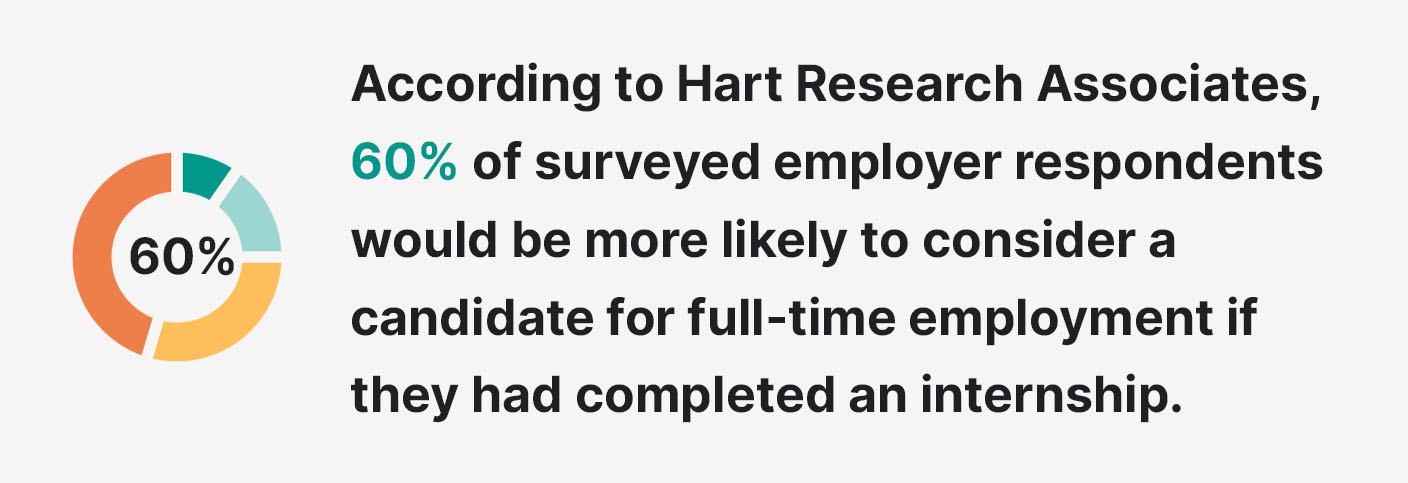
Corporations, as well as interns, benefit from such programs:
- Training an eager learner:
Contributing to someone’s success can be very satisfying. It is often seen as a privilege rather than a burden. The company that offers internships presents itself in the best possible light. Plus, it helps to teach a potential candidate everything they need to know.
- Exposing a new professional to the field:
Spreading awareness about your field or your brand to a new professional can be beneficial in the long term. The more young professionals that understand and associate with your brand, the more connected and likely they are to engage with you in the future. Who knows? Maybe one day, an intern you hired will start the next Google.
- Evaluating a candidate without hiring:
Sometimes it is hard to see if a candidate is a proper fit for the job. On paper, anyone can make themselves look great. However, in a real work environment, inadequacies are quickly revealed. An internship is an outstanding opportunity to evaluate a candidate without hiring them.
- Getting immediate results:
The company can try to fit in the role later if needed. During the busiest times of the year, an intern can help with immediate tasks without having to go through the full hiring process.
In other words, an internship is beneficial for both sides of the process. However, as an intern, you should expect some shortcomings:
- Unpaid job. It is probably the main disadvantage of the experience. Most people cannot afford to spend their whole summer working without getting paid. It gets even more complicated if an internship placement is in a big city. You may have to pay expensive rent, food, and transportation, and a lack of income can be troublesome. It puts people who do not have these resources in a disadvantaged position.
- Varying hours. Your schedule might depend on many factors and include working on weekends. However, most of it can be discussed and agreed upon well in advance to avoid further frustration.
- Labeling as an intern. Even if your ideas are fresh and creative, your new colleagues might not take them seriously. Lack of professional experience causes some to look as if you are not as smart and credible. It can cause a lot of frustration for some interns.
- High expectations from the get-go. Not everyone you interact with throughout your internship will know that you are still learning. Clients, vendors, and some of your colleagues may expect the highest quality of service and preparedness. Unreasonable expectations and low pay can affect your performance. You may end up feeling disappointed in the whole experience.
- Excessively simple tasks. The times when interns are bringing coffee and printing papers are mostly gone. However, it is still a common practice in some companies. Interns usually do the tasks that no one wants to accomplish.
Once you’ve learned all the cons and pros of the internship, it is time for you to find out where to look for one. So, how do you find an internship?
1. Evaluate your expertise and determine your career goals.
Try to look up positions and job titles of people with your major. As well as look at your personal experience. The next step in getting ready for the search is identifying transferable skills. It can be time management, creativity, ability to work under strict deadlines. Last but not least is identifying your interests.
2. Google internships in your areas or check job websites.
There are plenty of websites that connect students with potential employers. The Internet is the best place to start. Websites like Glassdoor, LinkedIn, and Indeed can help you find plenty of options.
3. Contact career services.
Every university has a website where employers post information about upcoming internships. Do not hesitate to check it out or reach out to career services.
4. Visit career fairs.
Career fairs allow you to meet and interact with a potential employer face-to-face. When you apply for the internship later, the company will be able to put your application forward. You can ask questions about the company and the position.
5. Reach out to companies.
You could try to reach out to companies directly through their website or LinkedIn. If there is no internship posting, you can send them your resume in advance anyway. It will show your interest in interning with them. Starting the conversation is essential.
⭕ 2. On-campus Employment
Working on-campus is an amazing option for students whose time-management skills require improvement. Balancing studies and job is hard enough, but when you have to fit a commute into your schedule, it can sound unendurable. Getting a job near your college is a great way to escape the issue.
Besides, being an on-campus worker, you will always be surrounded by fellow students, staff, and faculty members. Like living on-campus or getting a job here, you receive a perfect opportunity to establish a network. You get to know people—people get to know you. Isn’t it wonderful?
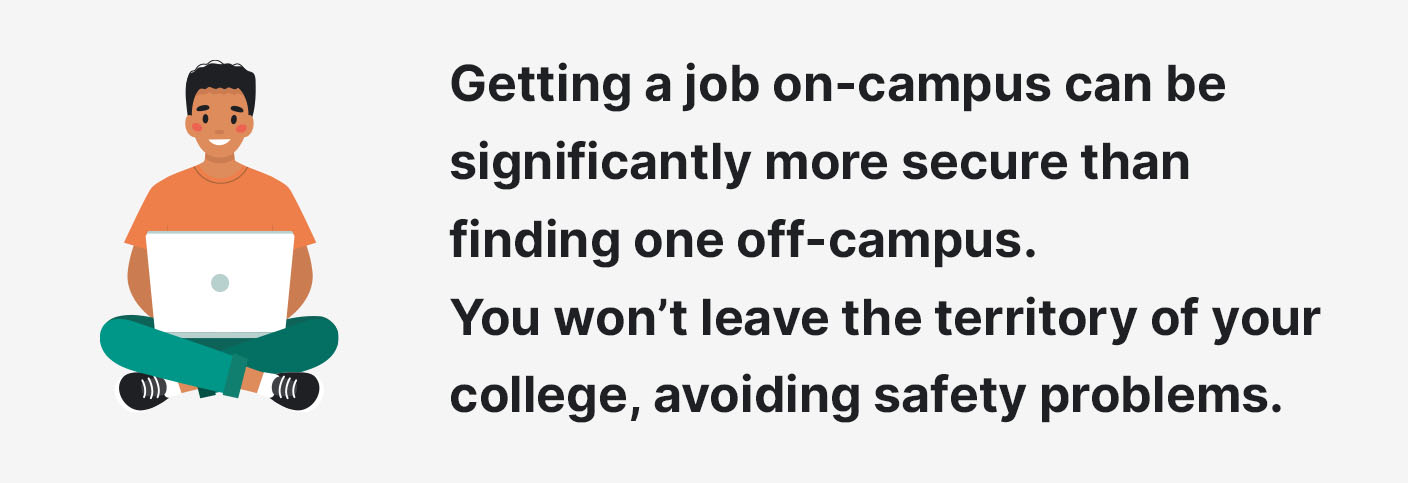
However, there are some challenges that you might face being a campus worker:
- Low wages. Usually, the salaries paid by the university are below average. So here, you need to set priorities for yourself. Do you want to have a flexible working schedule that would fit your classes? Are you aiming to integrate into the strong university community? Or do you have a goal of making a lot of money?
- Lack of positions. More students are seeking a job than there are vacancies on-campus. The university is incapable of providing everyone with an occupation. Moreover, on-campus jobs are usually quite simple. Usually, they don’t offer the students the working experience in the field they are majoring in.
Did you evaluate all the pros and cons and still doubting whether to work on-campus? The decision indeed requires time and consideration. Below, you will find why you should think about working on-campus:
- An opportunity to pursue an academic career.
Are you interested in pursuing an academic career? Consider joining a research team! Here you will have an opportunity to conduct research and work with faculty members. In this group, you will get to know what to expect from the occupation before you decide upon your future.
- Tutoring practice.
Very often, the universities have Student Success Centers, where tutoring services are provided. And guess what? The tutors are students with outstanding academic achievements. If you have strong writing or math skills, apply for the position. Sharing your knowledge and experience with others is always a great idea, especially if you wish to be a teacher or lecturer in the future.
- Office working experience.
Wondering how does it feel to be an office worker? Don’t wonder—try it! In colleges, there are a lot of administrative jobs. You can be an admissions assistant, a department assistant, an HR assistant, etc. You will have the perfect opportunity to get familiar with office operations and formal communication basics.
- An opportunity to serve the community.
If you want to be valuable to the college community, there are plenty of options for you. Residence assistant, event coordinator, campus guide, lifeguard are the perfect positions to help others. You can even manage social media accounts of the college.
- A great variety of workplaces.
On-campus employment usually involves such positions as a barista, library assistant, gym coach, etc. You can try drastically different occupations and get employed in the sphere you are interested in. Crazy about sports? Become a fitness instructor. In love with baking or coffee-making? Get a job in the local coffee shop. The choice is extensive.
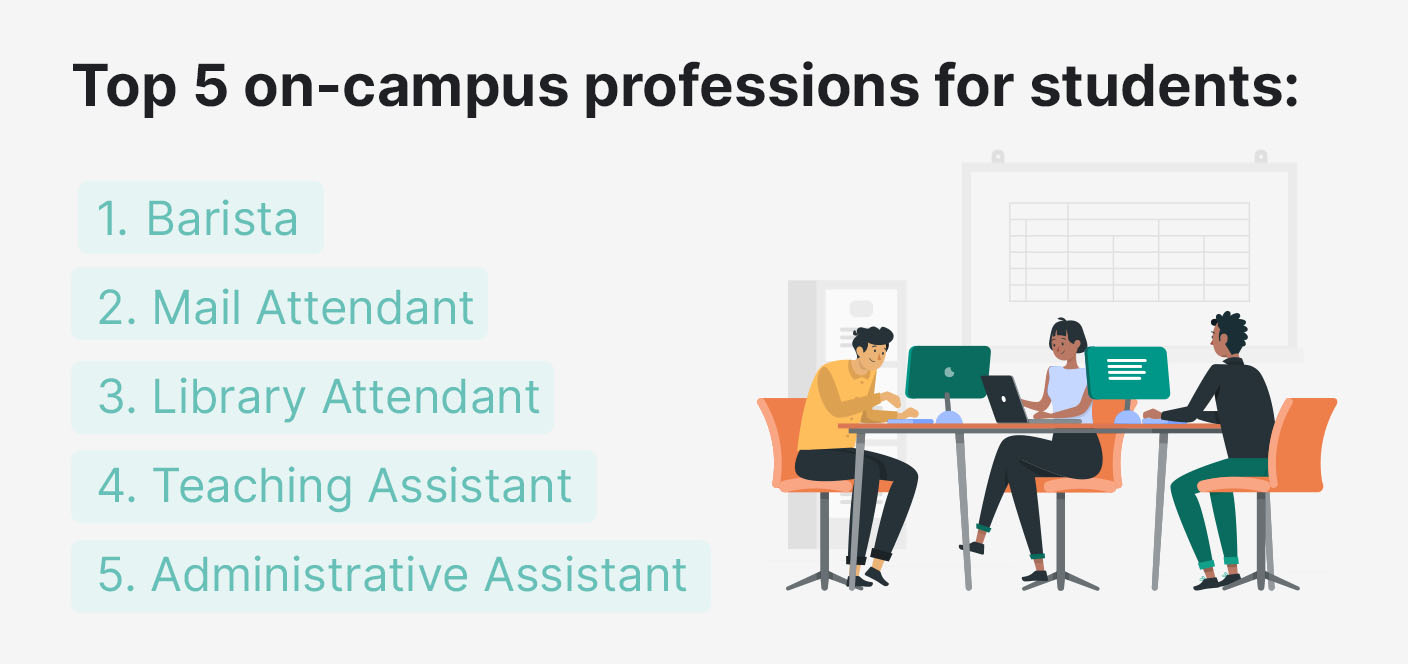
So, you are willing to work on-campus, but you have no idea how to get a job? No worries! We can help you to handle this obstacle. Follow our seven essential tips and get your dream position at the college without any struggles!
- Consider what occupation is preferable to you. As we have mentioned before, the choice of job positions is vast. Analyze your interests and priorities and decide what option is the most suitable for you. Remember, the more you like your occupation, the more pleasure it brings you. So, take this step seriously.
- Examine the college’s job board. If you are looking for on-campus employment, regularly check the job board updates. Once you see the free and suitable position, apply! There might be too many candidates, so don’t waste your time.
- Check flyers on cork boards. In the 21st century, there is plenty of communications tools. But never underestimate the power of traditional cork boards. There is always a lot of valuable info on them, including on-campus vacancies.
- Visit a career services center. Another way to get a job is to ask for help from a career services center at your college. So, don’t hesitate to visit them. People who work there definitely know the current situation and open vacancies.
- Ask around. The best way to learn something is to ask people directly. So, in attempts to find a job, ask people who might be willing to share their experience with you. They might be professors and students with a job on-campus.
- Ask employers directly. Establishing personal contact and asking about the position is another excellent idea. Don’t hesitate to talk with the employer if you know there is a free position. Demonstrate your braveness and initiative and increase your chance of getting a job.
- Investigate job searching sites and Facebook of your college. No wonder social media communication is a powerful tool nowadays. Put it to good use. Keep track of the news being posted on the official pages of your college. Maybe the fortune will be on your side, and you will find something valuable online?
⭕ 3. Part-Time Job
As opposed to other options on the list, getting a part-time job can guarantee you a steady income and fixed hours. These are the prime reasons why students pick it as a way to gain experience in college. However, there are plenty of downfalls that should be addressed.
Take a look at the following table and evaluate getting a part-time job:
Willing to find a part-time job but never succeed in searching? We know some useful tips. Use them and open the world full of career opportunities:
- Search tools
Do you know that there are websites that can find a suitable job for you? You provide personal data, and the tool offers you vacancies. Below, you can find the list of the most famous work search tools in different countries:
- The USA—Monster
- The UK—Student Job
- Canada—Flex Jobs
- Australia—Seek Australia
- New Zeeland—Seek New Zeeland
- Worldwide—Indeed
- Facebook and Instagram
Facebook and Instagram are two ultimate sources of information. As soon as you use Google for job-hunting, your social media platforms can start advertising positions for you. So, while searching for employment opportunities, don’t forget about these options. There are plenty of groups and accounts where employers post available job positions.
Unlike Facebook and Instagram, LinkedIn focuses only on providing employment opportunities. Create a profile there, update your resume, and start exploring your career options. You can find internships and volunteer opportunities here as well.
Note: Before applying for jobs in LinkedIn, learn how to use it right.
- Recruitment agencies
Recruitment agencies can become a useful tool for job search. Visit a local agency and consult its employees. They can help you evaluate all the opportunities and start your career!
- Visiting possible employment places
Establishing personal contact with a potential employer is probably the most effective way to get a job. Examine the local companies that might need a workforce. Usually, you are free to visit them and communicate with representatives. Demonstrate your potential and attract the employer’s attention.
⭕ 4. Freelance
Freelance is a job where a self-employed individual provides services regularly for several different customers. Usually, such jobs rely on short-term contracts. Freelancing is possible within creative, as well as most service-providing industries. It is an excellent way for students to control their schedule and leisure time, do something they enjoy, and get paid for it.

There are numerous freelancing options for different specialists. Here we gathered the most popular ones, accessible for students:
1. Tutoring
If you are a student, chances are you are knowledgeable in at least one subject. Naturally, there are people in need of help and who are willing to pay. Tutoring can provide a fair amount of money, and you get to make your schedule.
2. Content Writing
Content writers produce content for websites, blogs, articles, and social media platforms. Presenting readers with new information in an entertaining way can be challenging. If you are willing to take the challenge, then it’s a perfect gig for you.
3. Photography
This little hobby of yours might become a well-paid profession if you choose so. These days people are willing to pay you to shoot at their wedding, birthday party, graduation, or other things. You can make a decent amount of money, depending on your skills and experience.
4. Editing and Proofreading
If you end finding typos and grammatical errors, this could be a great gig for you. You get to proofread for journals, books, magazines, and any other type of written information.
5. Translating
You know multiple languages, then you are highly-demanded as a translator. You might translate books, articles, documents, and others. Besides, you can provide interpretation if needed.
6. Programming and IT support
Do you know how to set up and fix a computer? Then, an IT support job might be an excellent match for you. Can you write computer software and code? Small businesses are always looking for a programmer to create a website. Both jobs look equally great on the resume.
7. Babysitting (and petsitting)
Sometimes people get tired of their kids or pets, and they are looking for someone to sit them. Anytime they require an immediate vacation, you get a job. Unfortunately, it might not be as often as you wish.
8. Cleaning
Cleaning your house can be exhausting. Cleaning someone’s house and getting paid for it is another story. People are willing to pay someone to help them around the house. No fancy clothes are needed. Just be polite and good at your job.
9. Designing
Businesses are often in need of a designer to make their logo or a website. If you have a designing background, you can apply for the job. Just remember that companies might require the knowledge of such software, like Photoshop or Illustrator.
10. Blogging
You can do it independently or get hired by a company. Companies hire bloggers to attend various events and promote, but also for writing articles for the website. Keep in mind that it might not bring a lot of money if you want to do it by yourself.
There is a list of websites where you can find a freelance job:
What are the advantages and disadvantages of freelance? Let’s take a look at the following table:
How can you get involved in freelancing?
1. Determine your skillset. Identify your strengths and your field of expertise. Most of the time, your interests will overlap. Keep in mind that a successful freelancer is knowledgeable in his field, so concentrate on the skills you already possess.
2. Create a resume and portfolio. Clients will decide whether you are a good fit for them based on your experience and skills. You can demonstrate them via your resume and portfolio. Make sure to include your best work.
3. Sign up for a freelance platform. As a freelancer in the 21st century, you need a website where you can find orders and customers. Choose the platform you would like to sign up for. They differ by the services they offer. Depending on the type of freelance platform you choose, the process of searching for orders will vary.
4. Take starter jobs. You won’t be given any high-paid jobs in the beginning. Taking some low-paid orders allows you to gain some experience and feedback from your customers. As you work for some time, you will establish your credibility as a freelancer and will be able to show samples to potential clients.
5. Build a network. Meet deadlines and be consistent in your work. These are the first steps in building a network of satisfied clients, which is necessary for your success. You need to improve your communication skills and provide high-quality services, and people will reach out to you.
6. Search for long-term contracts. Managing a job as a freelancer can be complicated. Finding a long-term contract can help you create a consistent schedule. That way, the work will be more organized, and productivity will be better. Besides, your income will become considerably more stable.
⭕ 5. Volunteering
Volunteering is an activity that focuses on dedicating time and effort to helping a non-profit organization or individual. Such positions are usually unpaid. However, the experience of this kind of work brings is much more valuable than money.
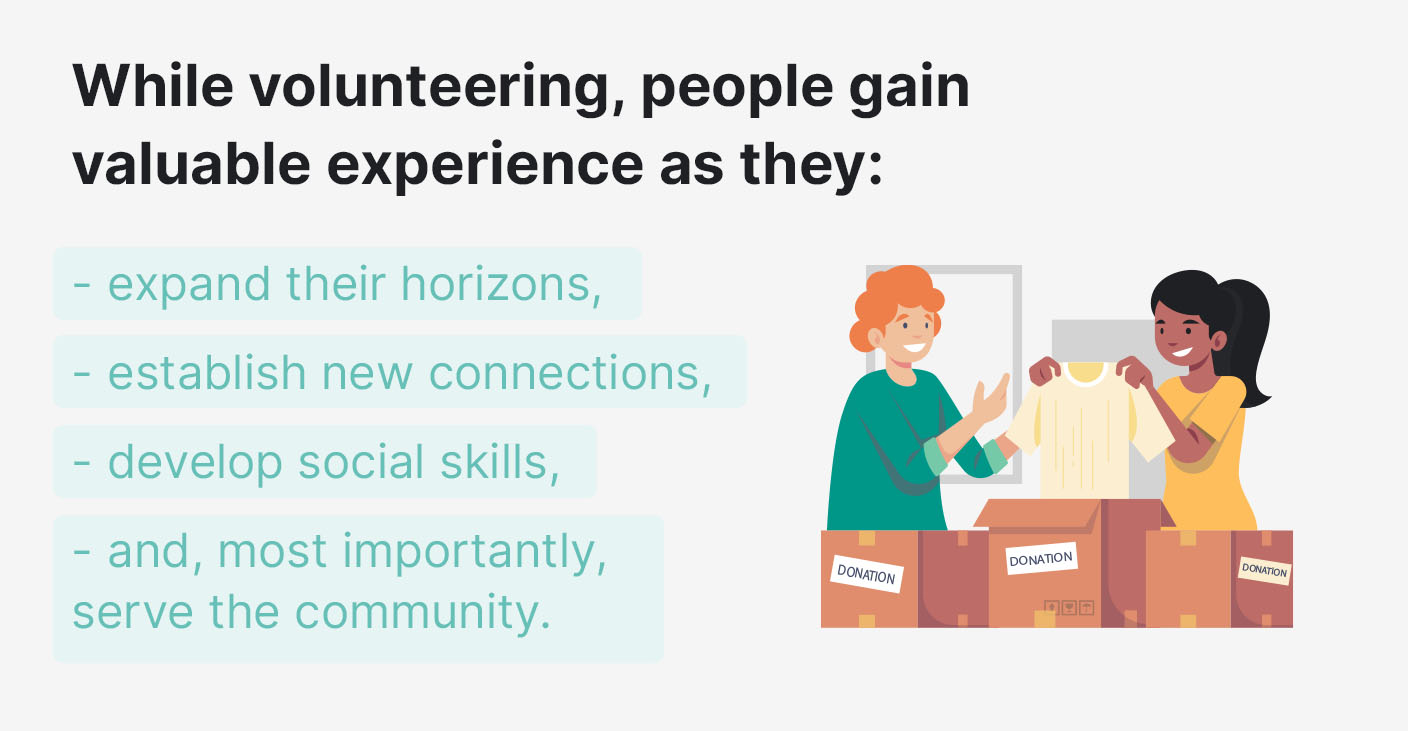
Unfortunately, students tend to underestimate the real power of volunteering. Don’t make this mistake! This kind of experience will bring you a lot of knowledge and significantly boost your resume.
Take a look at our tips and make sure you are benefiting from what you are doing:
- Volunteer in your field of interest. We don’t stop you from offering your assistance in a local shelter or orphanage. If you feel like this kind of activity will fulfill you—go for it! But how about volunteering in an area of your studies or profession? Then, you’ll get an experience valuable both for you and your future employer.
- Count hours you’ve spent volunteering. You will need this information in your resume as precise numbers add credibility and catch attention. So, keep track of your work. Writing down the amount of time you volunteered does not require much effort. However, this minor detail might have a tremendous impact on your resume.
- Don’t disregard networking. Offering help to your community, you’ll meet people and make acquaintances that may prove to be useful later. So, be open to new people, establish connections, show your potential to them! You never know who will lead you throughout your career path. Maybe one of the acquaintances you made while volunteering will play a crucial role in your future life.
Nonetheless, volunteering can be an exhaustive experience that demands a lot of time and effort from you. Facing such problems as dubious conditions and lack of respect for free workers, you can get emotionally tired very soon. So, before getting involved, evaluate all the pros and cons and consider whether your mental health can handle it.
The majority of the students face a serious problem, searching for a volunteer opportunity. It’s not clear how or where to find one.
The primary tip for you is to reach out to your institution or any non-profit organization in your field. All the contact information is available on the Internet, especially in the Facebook groups.
Another tip is to check the following websites that pick a project for you:
Besides the apparent volunteering in the area, you can consider less traditional ways, such as:
- Online volunteering
The field of your interest is not represented in the area you are living in? Do you have a tight schedule that does not provide you with the possibility to travel? Then, remote volunteering is a perfect option for you. Gain valuable skills without even leaving the house.
- Abroad volunteering
Abroad volunteering is the most suitable option for summer breaks. Working in another country has a bunch of benefits. In addition to gaining experience, you can learn about a new culture, make international friends, and develop worldwide networking. Are you a young and ambitious student seeking working experience and fascinating adventures? Don’t miss this opportunity then!
- On-campus volunteering
Sometimes you don’t need to go too far to get a job position. Guess what? There might be some volunteering opportunities on campus! Fundraisings, charity events, art evenings are prevalent on campus. Stay tuned! Check the updates on the college website or related Facebook groups and get your volunteering position on campus.
- Civil service
Another way of getting a job position is to work in the political brunch. Consider volunteering in a particular civil organization, working on an individual candidate, or being a local election committee member. Volunteering in civil services, you gain skills as well as become a responsible citizen.
🔖 Tips for International Students
With all this in mind, we have to clarify that getting job experience is more challenging for an international student. For starters, there is more bureaucracy involved concerning the student visa and opportunities. Then, there are time-related issues. Some students have to study at least one full year before working. Besides, many jobs require language fluency that such students can lack.

Thus, we prepared a list of tips for international students wishing to work while in college:
- The United States of America
While studying in the USA, an international student can get a job. Yet, there are various requirements and limitations on employment opportunities. To know what occupation you can get with your documentation, check the primary visas for students:
- F1 Student Visa. It is the most common option for an undergraduate involved in an academic or English language program. If you’re attending a college or university in the country, this document will let you live in the USA for the studies’ duration.
- According to its rules, you can work on-campus only. To find an appropriate position, contact your designated school official. They will help you fill an application and, if approved, you’ll be able to get a Social Security Number (SSN).
- Having completed an academic year of studies, you can try gaining experience off-campus. First, you need an economic hardship of a particular kind that qualifies for emergent situations. Then, contact your international advisor to find out what you can do. There are training programs that can help you start working in the field.
- M1 Student Visa. This document is given for non-academic or vocational studies. The holders are not allowed to work and have to pay for all the necessary living expenses and tuition in advance. So, in case you want to get employed, this visa is not for you.
- J1 Student Visa. The last option is specifically for those who come to the U.S. on a work-and-studies basis or visitor programs. It was created for students whose majors require practical training that they cannot receive in their country. Students can tutor, study, and get involved in other training programs, directly connected to their courses. Internships and working with non-profitable organizations are also allowed.
If you still have questions regarding your visa and possible employment, consult with the U.S. Citizenship and Immigration Services.
- The United Kingdom
In the UK, you’re allowed to work part-time (20 hours per week) as a full-time student and full-time (40 hours per week) during breaks. However, it’s available only if you comply with both state-run official institutions and your college requirements. You have to find out about the following restrictions:
- The university may be against its students combining studies with employment. It usually concerns the study programs that require your full attention. Consult your career service center or institution’s website concerning this aspect before other steps.
- Not every student visa allows you to get a job while studying. Standard Tier 4 visa (student visa) considerably limits your job opportunities. You can switch to a Tier 2 visa that will permit you to work in a particular field for five years. Then, a Tier 5 visa (short-term one) may be more manageable to get. Each option comes with various restrictions and opportunities that we advise you to examine on the official site.
- You have to be older than 16 years. It may not be a problem for most students reading this article, but keep it in mind nonetheless.
The labor market in the UK is most probably an entirely uncharted territory for an international student. Before job-hunting, we strongly recommend you visit a career center at your university.
- Canada
Canada allows international students to work if they have specific documents on their hands. That is to say, a person should be involved in a study program and obtain a valid study permit and Social Insurance Number (SIN). Yet, there are some other aspects:
- On-campus employment. For getting a job on-campus, you need a study permit with the condition that you’re allowed to work here. You can find a position once your study program begins, and your Social Insurance Number (SIN) is ready. As soon as you leave a college or change it, you have to obtain new documents. Until then, you won’t be able to work.
- Off-campus employment. To work off-campus, you may not have a work permit in some cases. First, you have to obtain a SIN and a study permit with work conditions. Second, you should start your program (at least six months long), being a full-time student at a designated learning institution (DLI). Keep in mind that you can work off-campus up to 20 hours per week.
- Internship or co-op. Sometimes, work is required to finish your studies and get a degree. If it is the case for your study program, you can apply for a co-op or intern work permit. Once again, you need a study permit and a letter from your college that reaffirms your request.
- Europe
Getting a job while in college is quite manageable in Europe, especially compared to the countries on the list. Any EU citizen can find employment in another EU country without a work permit. If you’re a non-EU student, you can usually get a part-time job with only a student visa. Some European countries put restrictions on work-hours and demand a work permit from an employee.
For more information about particular education systems and their limitations, consider country profiles. You can find detailed data about moving to Europe as a student on the EU Immigration Portal.
- Australia
As an average working student in Australia, you cannot count on living off your income. You’re allowed to work up to 20 hours a week, so you can earn some extra money but not a full-time salary. Yet you can expect at least a minimum rate per hour and support from the government as an international student.
To get a job while in college, you have to obtain a student visa with work permission. These are two separate documents that you can buy for A$575 (Australian dollars). They allow you to work from the moment you start your studies without a waiting period. You can apply for a visa online, in person, or by post. Contact your institution or education adviser for more information.
All the above can be done before you’re in Australia. Once you’re here, you should open a bank account to receive paychecks. For this purpose, you’ll have to get a TFN (tax file number) to file tax reports and other government documents.
- New Zealand
In this country, gaining job experience while in college is possible if your student visa allows it. There are different types of student visas, so try getting the one that permits you to work. If you already have one, you can check its conditions on the official immigration website or contact its representatives.
In short:
If you’re involved in a full-time study program that lasts at least two years, you can apply for a position. Even if you’re in an approved student exchange program for at least a year, you may get the permission. During breaks, your employer can ask you to work full-day, which is also allowed.
New Zealand actively supports international students who decide to work while studying. Looking for an occupation, you can consult Student Job Search, an official national organization, or a support service in your college.

Thank you for reading the article till the end! Good luck with finding a job and combining it with your studies. Share the link with other students who may want to get work experience while in college.
🔗 References
- The Good, the Bad and the Ugly—The Pros and Cons of Internships: Taylor Williams, Delta Tau Delta
- The Importance of Internships—How Students & Employers Both Reap the Benefits: The College of St. Scholastica
- College Student Employment Tips, Getting a Job in College: Matt Ishler, Affordable Colleges Online
- How to Find a Part-Time Job: Jake Butler, Save the Student
- Volunteering While in College, Best Ways to Give Back: Steps, Student Training & Education in Public Service
- Student’s Guide to Volunteering: OnlineSchools.org
- 10 Tips to Make the Most of an Internship: Career Education, Columbia University Center, New York City
- Tips for Internship Success Career Center: Berkeley, the University of California
- Understanding the Internship Process: Saint Mary’s College, Notre Dame, IN

![How to Beat the Monday Blues [Ultimate Guide + Infographic]](https://ivypanda.com/blog/wp-content/uploads/2020/10/tired-black-woman-with-glasses-in-hand-rubbing-eyes-309x208.jpg)
![LinkedIn for Students: How to Use It Right [Tips & Examples]](https://ivypanda.com/blog/wp-content/uploads/2020/10/digital-technology-internet-play-display-contact-309x208.jpg)
